The Aviator
 for thematic elements, sexual content, nudity, language and crash sequence.
for thematic elements, sexual content, nudity, language and crash sequence.
Reviewed by: Chris Monroe
STAFF WRITER
| Moral Rating: | Offensive |
| Moviemaking Quality: |
|
| Primary Audience: | Adults Teens |
| Genre: | Biography |
| Length: | 2 hr. 49 min. |
| Year of Release: | 2004 |
| USA Release: |
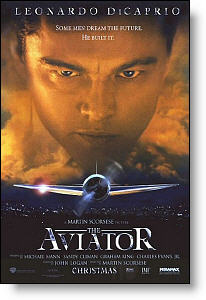
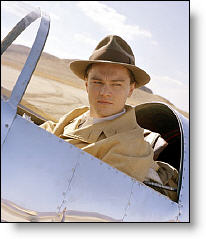
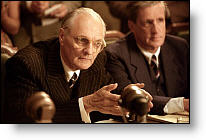
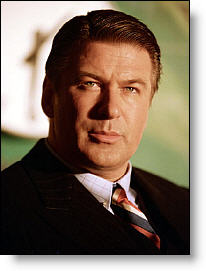
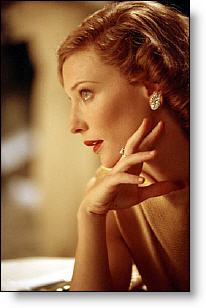
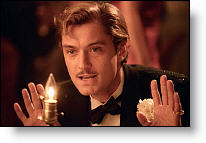
| Featuring |
|---|
| Leonardo DiCaprio, Alan Alda, Alec Baldwin, Kate Beckinsale, Cate Blanchett |
| Director |
|
Martin Scorsese |
| Producer |
| Michael Mann, Sandy Climan, Charles Evans Jr, Graham King |
| Distributor |
“Some men dream the future. He built it.”
Here’s what the distributor says about their film: “‘The Aviator,’ directed by Martin Scorsese and written by John Logan, tells the story of aviation pioneer Howard Hughes (Leonardo DiCaprio), the eccentric billionaire industrialist and Hollywood film mogul, famous for romancing some of the world’s most beautiful women. The drama recounts the years of his life from the late 1920s through the 1940s, an epoch when Hughes was directing and producing Hollywood movies and test flying innovative aircrafts he designed and created.”
High flying adorned but not adored is the new biography picture on Howard Hughes by long time director Martin Scorsese (Mean Streets, Raging Bull, Gangs of New York). The aviator Scorsese depicts here is a man who operates with vision and entrepreneurial skills—and meets with large amounts of worldly success—but is also one with his fair share of weaknesses and problems.
The bulk of this story begins in 1927 Hollywood with Howard Hughes (Leonardo DiCaprio) at the age of twenty-six directing his war film “Hell’s Angels.” After inheriting a large sum of money after his parents’ death, Hughes goes beyond filmmaking to pursue an ambitious career in developing and building airplanes. The conflict of the story eventually develops when Hughes buys TWA and must battle Juan Trippe (Alec Baldwin) of Pan Am Airlines and Senator Ralph Owen Brewster (Alan Alda) who seem to have a monopoly on the airline business.
Like his other films, Scorsese is not so much interested in plot as he is with character. “Raging Bull” dealt with a boxer’s career, but dealt more so with his personal life. In the Aviator, we see the career highlights of Howard Hughes, but also see his failed romances with Katharine Hepburn (Cate Blanchett) and Eva Gardner (Kate Beckinsale)—although some friendship with them is maintained. Further, we see a Howard Hughes who is a little obsessive/compulsive, who struggles with hearing problems and even suffers from schizophrenia. It seems that all of his achievements that are presented are tempered by some kind of failure he also experienced.
The most off-putting aspect of this film is the repeated use of the God’s name used in vain followed by the word “damn.” Over and over, and by various characters, we are assaulted with this word. The Lord’s name is also taken in vain a few times, as well as one instance of the “f” word. There are a few moments of nudity from behind involving Hughes, first as a young boy being bathed by his mother, and then later when he locks himself in his room and has gone a bit mad. (This scene also includes an unpleasant image of numbers of bottles filled with urine.) There is a moment with Hughes and Hepburn kissing leading to an implication of them sleeping together, but none of it is shown.
Some interesting directorial motifs that Scorsese has included involve bright light bulbs, animal flesh and Hughes’ obsession with cleanliness—especially with his hands. Hand washing is such a personal thing to Hughes that at one moment he is unwilling to lend a hand to a crippled man because it would interrupt his hand washing. In another moment, he loses his appetite for his steak after Errol Flynn (Jude Law) picks a small pea off of his plate and eats it. We see that Hughes is disgusted and will not eat.
But unlike “Raging Bull,” Scorsese has given us a protagonist that we can ultimately find likeable and partially respect. Although this character has personal flaws, we believe he is doing the right thing by speaking out against Senator Brewster and Juan Trippe. We can also find him likeable because he is presented as a kind of underdog who worked his way up, making many personal risks along the way. Some may disagree that Howard Hughes was actually this kind of everyman, blue-collar kind of worker. Nevertheless, where “Raging Bull” gives us a tragic character who thinks he’s great, here we have a kind of heroic character who thinks at times he is losing his mind.
This film is lavishly produced with several big stars and lots of CGI, but in the end isn’t terribly engaging. Earlier films of Scorsese made on a much smaller scale tended to be more captivating, but these big stories—even though they’re made more personal—don’t provide as much interest. Some of it is pretty impressive, but isn’t necessarily recommended.
Violence: Mild / Profanity: Heavy / Sex/Nudity: Mild


Apart from the message and themes introduced by the film, the acting is mediocre, the soundtrack is boring, the story is too dark and too slow, and the casting is borderline horrible. Leonardo DiCaprio tries hard enough in his role to make the movie watchable, but does not have the charisma to keep us interested in the main character. Cate Blanchett is not believable as Katherine Hepburn. And the director seems to have cast stars like Alec Baldwin, Alan Alda and Jude Law just because the dialogue in this movie is so bland and the story so choppy that the audience would never stay interested without them.
Still, I was glad that sex and violence were not emphasized in any part of this film. But other than that, there’s is nothing edifying about this film and for those people who actually know about some of Howard Hugh’s life, this film is not an accurate depiction.
[Very Offensive]
The use of the “g-d*mn” word was used liberally from start to finish, and way too much. There was absolutely no need for it, nor was there a need to use the word “f-k” (only once thankfully).
Overall, “The Aviator” was enjoyable and entertaining. However, my enjoyment was tempered by the avalanche of profanity that was so unnecessary. Nudity was mild and was not particularly offensive.
[Very Offensive/4½]
[Average/3]
Obviously due to the length of the movie, not to mention the fact that they probably won’t know or care about most of the people or events portrayed, you shouldn’t bring your kids along. I recommend it to anyone else though, and if you have kids that are advanced for their age I would say bring them. There is a plane crash scene that is WAY to bloody and intense for kids though, so keep that in mind. If your the type of person who gets uptight about the human body, you should know that there is some very mild “nudity” although all we see is a backside, really nothing to be concerned about, but I know some people are sensitive about things like that so I thought it might be worth mentioning. All in all SEE THIS MOVIE, it’s a fabulous way to spend 3 hours.
[Better than Average/5]
[Very Offensive/4]
Howard Hughes seemed to have it all. The movie shows how he used this wealth to make spectacular movies, woo the most glamorous women and build and fly the fastest and biggest airplanes. Yet despite all of his apparent success, as seen from the perspective of the world, his life was a miserable failure. Howard Hughes is portrayed as having low moral standards. He constantly uses the name of the Lord in vain. Seen from a Christian perspective, his foul language serves to emphasize his complete separation from God and his desperate need for God. Freed from the constraints that most of us live under, his life ultimately spiraled out of control and he descended into pathologic obsession and madness.
I do not think that becoming a Christian would have solved all of Mr. Hughes problems. The kinds of personality disorders portrayed in the movie tend to be very deeply ingrained. However, I think that as a Christian, he would have been able to live with his problems and not be dominated by them. For example, as a Christian, I think that it is much more likely that he would have had the humility to seek professional help for his obsessive compulsive disorder.
This movie is not appropriate for children younger than 15 or 16 years of age. Older teenagers and adults, however, may well benefit from seeing this example of a wasted life and discussing the difference that God might have made for Mr. Hughes, and the difference he can make for all of us.
[Average/4]
The only drawback to the film is the constant taking of the Lord’s name in vain. Fortunately, Scorsese spares us of any sex scenes. There is quite a bit of rear nudity involving DiCaprio, but it is non-sexual in nature. Some scenes are difficult to watch. The plan crash scene is quite graphic, and Hughes’ mental problems in the last hour can be quite unpleasant. For these reasons, I wouldn’t take anyone younger than 15 to see this film. However, most adults will find this to be one of the best films of the year!
[Average/5]
[Extremely Offensive/4]
[Average/4]
[Very Offensive/5]
[Average/2]
Too many people, even Christians, tend to view mental illness in a light that puts sufferers in the position of outcasts, even subhuman beings. While this movie is not for the younger set, adults and youth who are able to deal with mature themes will find this movie entertaining and thought-provoking. It is disturbing, yes, but in a way that we need to be disturbed.
[Better than Average/2½]
[Extremely Offensive/2]
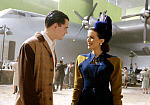


My Ratings: [Extremely Offensive/4]